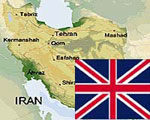 The Sunday Times: A British chemicals firm is involved in a secret MI5 inquiry into the illegal export to Iran of material that could make a radioactive “dirty bomb”.
The Sunday Times: A British chemicals firm is involved in a secret MI5 inquiry into the illegal export to Iran of material that could make a radioactive “dirty bomb”.
The Sunday Times
David Leppard
 A BRITISH chemicals firm is involved in a secret MI5 inquiry into the illegal export to Iran of material that could make a radioactive “dirty bomb”.
A BRITISH chemicals firm is involved in a secret MI5 inquiry into the illegal export to Iran of material that could make a radioactive “dirty bomb”.
HM Revenue & Customs (HMRC) raided the Essex home of the firm’s former sales manager after a tip that potentially lethal chemicals, including cobalt, were sold to Iran last summer.
The trade went ahead despite warnings from Whitehall officials that it posed an “unacceptable risk of diversion to a weapons of mass destruction programme of concern”.
Details of the dirty bomb case are disclosed in dozens of pages of documents lodged in the High Court by Remet UK, a chemicals firm based in Rochester, Kent.
At the centre of the probe is Jarrad Beddow, a 42-year-old married father of two, from Clacton-on-Sea, Essex.
Beddow, who lives with his wife Jennifer at a £400,000 detached home in a quiet cul-de-sac, last week denied any wrongdoing, saying that the material he is accused of exporting to Iran — cobalt aluminate — was not banned at the time of the transaction.
“The substance was checked against the dual-use materials list issued by [the government] and found to be absent.
“HMRC are not conducting a criminal investigation against me and I have never been arrested,” he said.
Beddow claimed the company itself was under investigation, saying: “My home was searched by HMRC as part of the investigation into my employer, where I willingly supplied information.”
Remet’s managing director, Stephen Pilbury, said it had reported the “illegal” trade to the authorities and was “fully co-operating” with the criminal investigation, which involves HMRC and, it is understood, the security service MI5.
Further details of the case are set to emerge this week in the High Court when the judge is set to release confidential government documents after an application from The Sunday Times.
Pilbury said the firm had immediately suspended and then sacked Beddow after discovering what he had done. It is now suing him for breach of contract.
In its writ, the company states that Beddow “arranged and/or effected the illegal sale of Remet’s products to a customer in Iran” — a company that supplies the Iranian power industry.
The material was sent via a middleman in Slovakia to Mavadkaran Engineering, a firm in Tehran that makes turbine blades for the Iranian power industry. The company was unavailable for comment.
In its writ, the company produces various email exchanges which it claims show that, despite the refusal of the UK Export Control Organisation to grant a permit in September 2008, Beddow went ahead and sold a consignment of cobalt aluminate to the Iranian company via his Slovakian contact.
The firm also accused Beddow of making a series of inflated or inappropriate expenses claims over trips to China and Turkey, which he denies. Last summer, he and his wife Jennifer are alleged to have spent three nights at the Marmara, a five-star boutique hotel in the Turkish seaside resort of Bodrum, at the company’s expense.
Beddow claimed the trip was work-related and allegedly claimed £1,657 for it. But the company says its real purpose was a holiday for himself and his wife.
Nuclear experts say compounds such as cobalt are more likely to be deployed in a so-called dirty bomb than in a conventional nuclear weapon.
Cobalt aluminate is used in the preparation of magnetic, wear-resistant and high-strength alloys but its export to certain countries such as Iran and North Korea is controlled because it can be used in a nuclear reactor to make cobalt-60, one of the most deadly radioactive isotopes.
Dr David Thomas, an expert in nuclear research at the government’s National Physical Laboratory, said: “Anything that has cobalt in it, if put in a reactor, will capture thermal neutrons and make cobalt-60.”
Last month in Delhi, cobalt-60 was responsible for what the International Atomic Energy Agency described as the worst radiation incident worldwide in four years.
In the past five years there have been anecdotal reports that Iran may be trying to import material for use in a dirty bomb.
Western authorities are particularly concerned about Iran’s nuclear ties with Russia. Moscow is helping Tehran to build a 1,000-megawatt reactor that will produce non-weapons-grade plutonium.
Reports say it will produce unlimited quantities of radioactive waste including plutonium for dirty bombs. These would be sufficient to load onto ballistic missiles targeted at Israel. Alternatively it could provide terror groups with links to Iran — such as the Taliban — with the radioactive ingredients for a dirty bomb.


